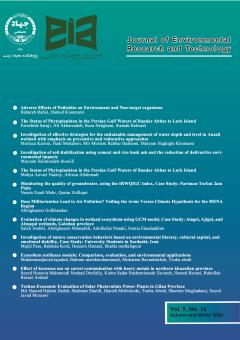Investigation of nature conservation behaviors based on environmental literacy, cultural capital, and emotional stability, Case Study: University Students in Sardasht, Iran
Subject Areas : planning; Environmental education and management
Majid pato
1
![]() ,
Bahman kourd
2
,
Hosain osmani
3
,
Shahla mostafapour
4
,
Bahman kourd
2
,
Hosain osmani
3
,
Shahla mostafapour
4
1 - Research Assistant Professor, Department of Forests and Ranges Research, Center for Research and Education of Agriculture and Natural Resources of West Azarbaijan Province, Organization of Research, Education and Extension of Agriculture, Urmia, Iran
2 - Associate Professor, Department of Psychology, Mahabad Branch, Islamic Azad University, Mahabad, Iran-
3 - Master's degree in educational psychology, Islamic Azad University, Mahabad, Iran
4 - Master's degree in educational psychology, Islamic Azad University, Mahabad, Iran
Keywords: nature, environmental literacy, environmental knowledge, cultural capital,
Abstract :
Awareness of issues related to nature conservation can serve as a key factor in promoting pro-environmental behaviors. This study examines the role of environmental literacy as the main variable and its relationship with emotional stability, cultural capital, and environmental conservation behaviors among students of Islamic Azad University and Payame Noor University in Sardasht, West Azerbaijan Province. The research method is based on structural equation modeling (SEM) to analyze the relationships among the variables. The statistical population includes all students of the two universities in Sardasht, from which a sample of 357 students was selected using multi-stage random cluster sampling. The research instruments comprised standardized questionnaires on environmental literacy, cultural capital, emotional stability, and nature conservation behaviors, completed by the participants. Data analysis was conducted using SPSS and SmartPLS software. The findings indicate that citizens’ environmental behaviors are influenced by multiple factors, with educational level being one of the most significant. Accordingly, individuals with higher levels of cultural development demonstrate greater awareness and responsibility toward the environment. Additionally, environmental literacy acts as a mediating variable in the relationship between emotional stability, cultural capital, and environmental conservation behaviors. A significant correlation was found among these variables (p ≤ 0.01).
